- Home
- Ralph Peters
Shadows of Glory Page 9
Shadows of Glory Read online
Page 9
He was a good man, Reg’lar John, and he knew he had brought me down a bad road. But none of us knew it would lead to such a tragedy before the winter’s end.
SIX
I FOUND HER. WE LOST NOT AN HOUR OF THE DYING day. For all those rambling miles of whiteness, the horses pulled us toward her as if she had called them. A black slenderness glimpsed across the snow, she stood where the earth fell away from the moors. Standing at the end of the world. There was no face to the figure, but I knew it was her.
The horses would have left the track and rushed across the highlands, but the driver stopped them. There were marshes, he said, between the road and the girl, and ponds concealed by snow. The sleigh would surely go under.
He reined back the beasts and managed their stamping, while I climbed down and worked my way toward her. A withering wind come up, dusting old snow across the heights, and I drew my coat in tighter. My hat would not hold to my head, so I used it to shield my eyes against the blow. Keeping her in sight, I plunged along, cane sinking into the drifts. I feared she might vanish if I looked away for an instant.
In a grove nearby, the branches clashed like swords. Warning me away. Garbed all in black she was, black in a white world, the only color a flag of red hair snapping out from her shawl. She faced the far ridges and the falling sun, and I felt her clinging to the last ghost of warmth.
“Luck,” you will say. “He found her by luck.” But it was fate. I will believe that until the day I die. And perhaps beyond.
My boots crunched and squeaked as I hobbled across the snow. Suddenly, my bad leg sank down in a drift, and I will tell you: The fears of a man disturbed as I was are the terrors of a child. My cane found no bottom as I struggled. But then I broke loose again, for we are made tenacious. Only a bad knit of bone in my leg did not like the cold that returned with my freedom. The weaker of our parts would sleep forever, and only will and duty keep us well.
“Miss Kildare!” I called, but the wind took my words. I feared surprising the girl, for she stood at the edge of the promontory and I knew not what waited below.
Toward the end of the field the snow had swept thin over stalks and stubble. I heard a whinny and saw a black horse in the trees, head down. Now I am a man who notices things. But horse I had not seen.
Only her.
Her.
I called again, but still she did not turn. I wondered if I might not be mistaken, rushing to disturb a farmer’s widow.
The wind stretched out her hair, longing to carry her away.
I stopped ten feet behind her. In a world silent but for the keening of the sky.
“Miss Kildare,” I called.
She turned.
I had worried about the sick girl traipsing over the countryside in such weather. But now I understood.
Standing there, with the falling sun behind her, standing at the edge of the abyss of the lake, upright in that cold and matchless world, she belonged not to us but to Nature. She fitted it like the groves and bracken, like the lean fields and the sky. The rest of us were intruders on those high moors, but she had come home. For hers was no gossamer beauty, meant for parlors and lingerbeds, but a sum of wildness.
And beautiful she was. Not of a cast as common as our desires, but possessed of a beauty invulnerable to our smallness. Twas as if the wind were sculpting her before my eyes, defining her as I watched. That hair belonged as much to the sky as to her person. Her father had been right: Among us, the girl was caught between two worlds. But now she was where she belonged.
I had disturbed her. I felt as if I had touched her with coarse hands.
Yet she smiled. A meager smile to break the heart.
“I knew,” she said. “I was waiting for you.”
I stepped toward her, close enough to talk without raised voices. She seemed to have no fear or care of heights, but stood to dare the depths. The drop was not sheer, yet steep enough to kill, a long slide of ice. Far below, black trees pointed up from the lakeside. You would fall forever.
“Miss Kildare . . . I must talk to you.”
A mask of hair covered her mouth. She swept it away.
“I cannot help you,” she said.
All the miseries that I had held suspended since the night before, the devils I had fought down, the years of confined remembrance . . . of a love that scorched then died . . . all that swelled inside me.
I was not master of myself.
“Please,” I said. “I must know the trick of it. How you learned those things.”
She shook her head in a sorrow I could not grasp. “I’m sorry, sir.” Her speech was good, but when she said “sir” it come out “sor” and Irish.
The wind scoured the fields, sparkling the air between us, stinging.
“Miss Kildare . . . I beg you. The things you told me . . . about the woman and child . . . the matters described . . . her voice . . .”
“I cannot help you that way,” she said, voice gentle. Pitying me from a distance. “I would, sir, but cannot.”
“Was it a fraud? Please, Miss Kildare. Did someone put you onto me? Now there is cruel. Was it a joke? I must know.” I looked at her through a veil of blown snow, adding, “I will not betray the secrets of your trade. I promise you.”
She stared through me. With those peat-fire eyes. Behind the whips of hair, her forehead creased.
“Don’t you understand?” she asked. “I thought you would be the one to understand . . .”
“Understand what, then?”
A crow rose from a thicket.
She closed her eyes and lowered her head. Her voice spoke from the depths of that storm of hair.
“That I don’t know,” she told me. “I don’t know what I told you. In the trance . . . they come . . . the voices. But I can’t remember! Don’t you understand?”
“But surely, Miss Kildare . . .”
She parted a curtain of hair and the bones of her face reemerged. In that moment, she looked mad.
“I see things . . . I see them now . . . spirits all around you . . . but so faint . . . I can’t tell, can’t make sense . . . how they follow you . . .” Twas her eyes pleaded now. “It’s only the daytime things that I remember anymore . . .”
“You told me about a woman and a child. A woman . . . not my wife.”
“I can’t remember.”
“Miss Kildare . . . I’ll pay. If it’s money, see.”
That grieved her. “They all offer money.”
“What do you want, then? For the love of God!”
“Peace,” she said. “I want them to stop. I want them to leave me alone. I thought you’d be the one to understand. Spirits all around you . . . they told me you’d come.”
She fell to her knees. At first, I thought she was in a faint and moved to catch her, fearing she would slip into the abyss. But she held herself straight-backed, mittens joined as if praying. Two tears fell, one from each eye. Their trails froze white.
“I just want them to stop,” she said. “My . . . father . . . doesn’t understand. That I can’t control them. Why I can do one thing and not another.” She raised wet eyes to me. “He was in a rage last night. He wanted me to summon Queen Elizabeth . . . to pretend . . . for the Stanton woman. He thinks I lie about the trances. He thinks the Stanton woman hides her wealth, but he’s wrong . . .”
Carefully, I moved toward her. Anxious to bring her back to her feet. On the edge of that precipice. “Miss Kildare, you must rise. You’ll catch your death.”
She looked up and laughed.
“I’m not afraid,” she said.
“What . . . do you see now?” I asked in a coddling voice, inching closer. I knew not what to make of her or her confidences. “What spirits, then? Look you. I need to know. To keep the devil off me. Something. Anything. Tell what you can, I beg you.”
She lowered her eyes to the snow.
“They’re like gauze . . . so soft. They move when I try to look at them. As if they’re playing with me . . . teasing me. The
y’re all around you . . . an army of them . . . protecting you . . .”
A queen accepting aid, she let me lift her. For a moment, we stood so close I smelled her sickness.
Her smile twisted. As if she read my thoughts. “You doubt me. You of all men.” She put on a hard, common look. “Will stage tricks be enough, then? To convince you? Do you want to see the things they line up to pay money for? Is that what you want?”
“Miss Kildare . . .”
She closed her eyes. “Beneath your coat . . . you carry a revolver . . . given to you . . . by younger men . . . given to ask forgiveness . . . they left you to die . . . there were horses . . . have a care, the second chamber will not fire, for you set a bad cap to it. And in your pocket . . . by your heart . . . a letter from a friend who saved your life . . .”
She opened her eyes and gave me a forlorn look. “More, sir? Or is that enough?”
“But how . . .”
She shook her head. The hair free of her shawl lashed her white face. “I can’t explain. I’ve always had the gift.” The pair of tears left trails upon her skin. “I thought you understood.”
“But you claim to communicate with the dead? In your trances?”
Her smile turned wistful and blown snow narrowed our eyes. “The spirits say there is no death . . . but I don’t know. I don’t know what happens in the trances. Perhaps the spirits lie. Like men. I’ve told you . . . I know only that which comes to me . . . when I’m like this. The things I see by day. The rest is darkness.” She canted her head and her hair streamed. Pulling her away. “Men have souls of glass. Their thoughts are all the same. I see them so clearly. But you’re a hard one. They flee, but you come on. Even your wanting is different. When they stand in front of me, they’re running away inside. And the Irish . . . they all believe I’m a witch. They’d burn me. Or worse, if they could. But you’ll never run away. You understand. You’re not like them.” Slowly, a rising scale, her distress grew. “They’d push me under the ice.” She glanced to the side. “Or over this edge . . .”
“Your father protects you, of course.”
That fragile smile again. “The priest protects me.”
“But surely your father . . .”
“Counts the money . . . it’s always the money with him.”
The light was quitting us. Instead of a grand-hued sunset, as on the day before, this twilight was soft, weak. A gloaming of lilac and gray.
“Miss Kildare,” I began in a businesslike voice, for I had done my mental accounts in that instant, “I know not what you’re about. Though wish you well, I do. Yet, there is something queer here, and you might begin by telling me . . . why you appear to reveal so much to me, a stranger? A stratagem is it? For it seems you’ve told me much, yet you’ve told me nothing at all. And this last confidence, regarding your father . . .” An inspired question struck me. One that would test her “visions” well enough. “Miss Kildare—would you just tell me this, then: Is there to be an insurrection among your Irish? Against our Union?”
My dullness crushed her.
“There is no insurrection,” she said blandly. “No rebellion.”
“Anything else, then? Any untoward doings of which you know? Anything you see in your visions?”
She shook her head. Slowly. “I cannot tell you such things.”
The last of the sun filled with color: Twas red as blood again.
“Cannot? Or will not?”
“Will not.”
“But why? After you’ve—”
She reached out and laid a mittened hand on my forearm. It quelled me instantly. As if a force had poured into my body.
“Don’t you see?” she asked, near pleading. “It changes nothing. What comes, will come. I can only watch. None of us can change it.”
“Then why . . . talk to me at all?”
She stood back, haloed by the sunset. Heels on the edge of oblivion. There was strange. Twas she who looked baffled now.
“But you’re the one,” she said. “Don’t you know? Haven’t the spirits told you?” She looked near despair. Clapping her hands to the side of her head, as if her thoughts pained her, she cried, “Please, help me . . . they play tricks . . . they won’t stop. I can’t tell what you know and what you don’t. Only that you’re the one . . .”
“The ‘one’ what, Miss Kildare? What am I, then?”
She looked at me, her beauty on fire, amazed at my ignorance.
“The one who came to kill my father.”
NOW WHAT DO YOU SAY to a mad thing like that? It shocked me. The very thought of such a thing. And that a daughter might say it so. I saw she was sadly touched, and not by mystic spirits.
She had jarred me with the parlor trick of describing my pistol and the letter in my blouse. But I had read enough of mesmerics in the newspapers to know that mountebanks had a knack for reading a fellow’s eyes or getting their victim to suggest things with his expressions. I saw then that the seance of the night before had been a mere charade, its details but awaiting explanation. Naught but cruel mischief there. And I had been drawn in like a country lad by a recruiting sergeant. Weightier affairs wanted my attention, for I had a charge and a duty.
Yet, she drew me.
I sought to reason with her as the darkness gathered around us. But she was beyond the power of all but prayer, and only repeated that I was “the one.” She said it in a voice that bore me no malice, but her words were all the madder for that. The air come colder over us, and I repeated my concern for her health. At that, she changed. Sudden as the tides of battle. She bid me adoo and fair leapt upon her horse. As if gone over to the spirits already.
I watched the beast carry her away, leaping drifts. She seemed a fearless horsewoman, but still I had no sense of her bravery. To me, she was only a lost girl, dying. Her cape and shawl streamed behind her, different shades of darkness. Then she disappeared into a swale. Twas a wild place, those high moors, and she as wild as any of it.
Reg’lar John awaited me along the farm track. “All reg’lar,” as he said. Yet, he was relieved to see me.
“Ain’t no good up here,” he told me. “Nothing good never happens up this way.”
The horses wanted to go, and we galloped along the ridge. Twas as if the beasts themselves were in haste to leave the place. They did not slacken until we had left behind the dueling taverns and the gibbet where the corn dolly’s head still hung.
By the time the team had used up its spunk, we were back in the lowering of the ridge, where the farmhouses were larger and well tended, with proper barns. Yellow-lit windows cast their glow across the fields. Again, I saw the town in the distance.
Reg’lar John sang hymns as we descended. I felt the Colt hard against me and did not join in.
WHEN I COME INTO THE PARSONAGE, scraping the snow from my boots, the Reverend Mr. Morris and Mr. Douglass were already at table.
“We waited,” Mr. Morris assured me, “waited as long as we could. Food getting cold, getting cold . . .”
“The major looks a bit chilled himself,” Mr. Douglass said, rising from his chair to welcome me. As if I had become a valued friend. He really was a proper gentleman.
“Duty, duty,” Mr. Morris said. “Brother Jones has his duties.” He looked up from his plate, upon which a meager sadness of a meal lay sulking. “Are the killers discovered? Have you discovered the killers? Are we safe now?”
“The day,” I answered, taking off my greatcoat, “went awry, see. But there is tomorrow.”
“Dreadful about the Irish girl, dreadful,” the pastor went on as he spooned up peas. “Weak creatures, so weak. Drawn to sin, the Hibernians . . .”
I sat me down, for the housekeeper had laid out a place for me, a paying lodger. “Sin,” I said, tucking the napkin into my collar, “is in us all, is it not, sir? Did not the great Wesley—and I speak of John Wesley himself—did he not write in his Christian Perfection that no man can say ‘I have no sin to be cleansed from’?”
“Surely,
surely . . . Wesley, Wesley . . . but the Irish, Brother Jones . . . the Irish . . . magnitude . . . proclivities . . . proclivities, sir! And propensities!” His lacquered peak of hair shook at the ceiling.
I looked at Mr. Douglass, wondering what a Negro might make of such a judgement, for such a one must know what it is like to be convicted by his brother’s fall. But the African only smiled a bit and applied himself to his plate.
“Mr. Douglass?” I said, wishing to change the subject. For I had Irish behind me and Irish before me, and would not have them with my supper, as well.
That solemn Nubian turned his eyes upon me.
“I have met one of your fellows this day,” I continued. “A certain ‘Reg’lar John.’ He claims you are not unacquainted.”
Mr. Douglass chewed, nodded and swallowed. “That would be John Brent.” Suddenly, he grinned, with strong teeth. Now Mr. Douglass was not a smiling man by nature, but mirth he saw in something I had said. “Tell me, Major Jones, how did this ‘Reg’lar John’ fellow strike you?”
“John Brent, our John Brent,” Mr. Morris added in support.
I swallowed a mash of peas. “Why, a good enough fellow. Simple.” I thought over the day. “Likes a good hymn,” I said, with a glance at Mr. Morris.
Now there were any number of looks shooting about that table: Mr. Douglass at the pastor, the pastor at me then at Douglass, Douglass at me, and me looking at both of them in turn.
At last, Mr. Douglass laughed out loud, collecting a chuckle from Mr. Morris.
“Do you,” Mr. Douglass asked when he had settled again, “hold acquaintance with many of the sons and daughters of Africa, sir?”
Well, I had lived some months in Washington, where the poor creatures were still enslaved under the law, if quietly. And freed men there were, too. But my contact with them had not been close.
“I have observed such, sir, but regret I cannot count them my intimates.”
Douglass let a smaller laugh. “Well, regret it or not, I’ll let you in on a little secret, Major Jones. The simpler a Negro appears, the more he conceals. It is . . . a hard-learned trait. Born of suffering.” He smiled with unanticipated warmth.

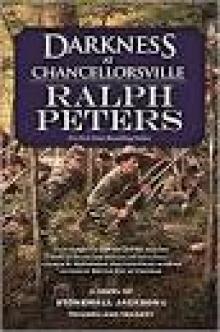 Darkness at Chancellorsville
Darkness at Chancellorsville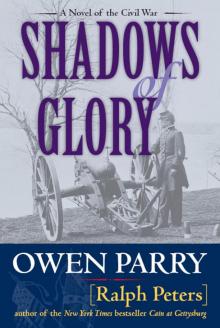 Shadows of Glory
Shadows of Glory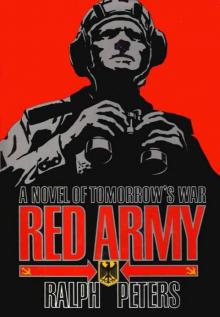 Red Army
Red Army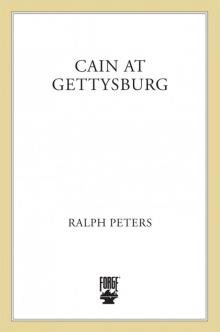 Cain at Gettysburg
Cain at Gettysburg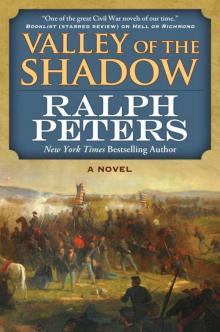 Valley of the Shadow: A Novel
Valley of the Shadow: A Novel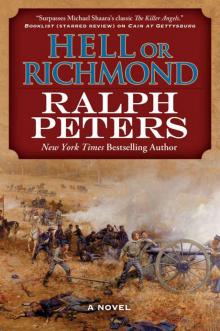 Hell or Richmond
Hell or Richmond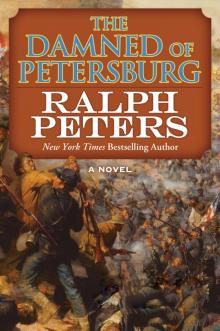 The Damned of Petersburg
The Damned of Petersburg The War After Armageddon
The War After Armageddon The War in 2020
The War in 2020